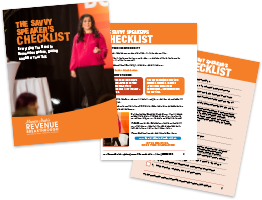How to Use Debt to Grow Your Business
 Every week I meet women who are afraid to use credit cards for their businesses or who have business debt for which they carry much shame.
Every week I meet women who are afraid to use credit cards for their businesses or who have business debt for which they carry much shame.
I’d like to set the record straight on debt for small business owners. This is simply how I see it and it is a controversial topic. I invite you to make your own decisions around using debt, or what I’d like to call leverage, in your business.
There is not a single large company out there that does not have some sort of debt on the books. And, most companies start with a loan or funding to help them get through the first three years.
Many of you as small business owners who run a client-based business (that’s you as a coach, consultant, designer, speaker, financial planner, accountant, lawyer, acupuncturist, etc) do not start with any money to run your business, no loan, no funding. Since a business needs time to grow, cash flow is slow at the start. This puts you in an incredibly high-pressured situation to make money yesterday. Can you relate?
So what happens when you don’t have cash flow? You end up working super hard, hiring low quality vendors, and trying to learn as you go along. You can’t invest in high-quality business coaching, get the support you need and take the time to think about your businesses from the big picture. The result is a business that is unorganized, not very profitable and colossal time-suck for the owner.
Here’s where credit cards come in handy.
Credit cards (especially interest-free ones) can serve as a short-term loan in your business. You can put things like website redesign, virtual assistants, business coaching and training on your card to make your life easier in the beginning.
Here’s the trick. You have to make smart decisions on your investments and you must create a plan to pay off those investments within 6-12 months.
How do you make a smart spending decision?
1. Ask questions. Do not hire anyone without asking questions and making sure the vendor can help your exact needs. Do not make emotional spending decisions.
2. Compare. Make sure you look at the market and find the person and services that are best suited to you and your business.
3. Write Down Your Thoughts. Put pen to paper and write down why you should spend the money. Do pros and cons. If the pros outweigh the cons, you are making the right decision.
How do you ensure you make a return on your investment for coaching and training programs?
1. Make sure the program has content that you can use in your business where you are right now. That way you can make money fairly quickly and be able to pay off your cards within 12 months. So if you are just starting a business, you want a general foundations program, not one that teaches you social media specifically. You need to learn how to get clients.
If you’ve been in business a while, you need one-on-one coaching to refine your marketing and help you get to the next level.
2. Take advantage of every aspect of the program. Go to every class, do the homework, ask questions. You can’t get the results if you don’t do the work.
3. Take 110% responsibility for your outcomes. Be real with yourself. If you’ve been focusing on your personal life, your business will not grow.
4. Get extra help when you need it. If you are in a group program, sometimes you may need some extra one-on-one attention to get your questions answered. Don’t be afraid to ask for that help (even if it means you have to pay for it). I know that I’ve bought extra hours from every single one of my coaches. And one 30-minute appointment that clears up a limiting belief can lead to thousands of dollars in income.
I hope this helps you to use credit cards in your business in a smart way – as leverage to help you get to the next level. Please leave me a comment below and let me know what you think.







